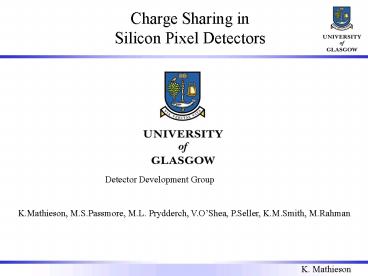MCNP Simulation - PowerPoint PPT Presentation
1 / 12
Title:
MCNP Simulation
Description:
MCNP 4C MEDICI. Models X-ray interaction using the Monte Carlo method in 3D ... Combination of MCNP and MEDICI allows simulations. that accurately reproduce ... – PowerPoint PPT presentation
Number of Views:555
Avg rating:3.0/5.0
Title: MCNP Simulation
1
Charge Sharing inSilicon Pixel Detectors
Detector Development Group
K.Mathieson, M.S.Passmore, M.L. Prydderch,
V.OShea, P.Seller, K.M.Smith, M.Rahman
2
Overview
The Dash-E detector system Charge sharing -
experimentally Charge sharing -
simulation Comparison - experiment v
model Model predictions
3
Introduction
If charge is generated in one pixel not all of
the charge may be collected at that pixel, some
could be shared with neighbouring pixels leads to
Two physical effects at X-ray energies
Photoelectron production and subsequent multiple
scattering
Charge Transport Drift and diffusion of carriers
through semiconductor
Problems
Poorer energy resolution - reduced counts in
photopeak, higher background Spectroscopy
difficult to detect trace elements
Double counting in photon counting detectors -
leads to an increased threshold Loss of
information e.g. for medical imaging increased
dose to patient
4
Dash-E detector
PAC5
Si detector
SHAMROC R/O
SHAMROC R/O
PAC5
300 mm pixel pitch 16x16 array of n n p
diodes 20 ms shaping time If one pixel whole
matrix can be read out
Designed and built by P. Seller, M.L.Prydderch et
al. CLRC Microelectronic lab
5
Dash-E Characteristics
Energy range 4keV upwards Noise (FWHM) at 5.9
keV 266 eV /- 12 eV Room temperature
operation Peak to background 1
5.9 8 13.4 17.5 22.1
32.2
6
Experimental Method
Data set taken for Rb, Mo, Ag, Ba in all
mode one pixel hit, whole matrix readout Max
value of each readout cycle is selected as the
hit pixel 8 surrounding pixels and the hit pixel
are selected from each readout cycle Upper
threshold placed at 1keV above the Kb peak
only want hits from the chosen spectral
lines Charge shared to surrounding pixels is
expressed as a percentage of the total
charge Increase the low energy threshold to
investigate how charge sharing varies with
threshold
7
Charge Sharing - Experimental
Charge sharing depends upon where the electronic
threshold is placed
Only events which have shared charge have been
selected Raw data
Clustered spectra corrects for charging shared
events lowers background increases photopeak
Energy dependence, at these energies on the
amount of charge shared
8
Charge Sharing - Simulation
MCNP 4C MEDICI
Models X-ray interaction using the Monte Carlo
method in 3D Photoelectron production, multiple
scattering and K,L shell fluorescence
2D finite element electrical simulator Solves
Poissons equation and the continuity equations
9
Charge Sharing Simulation
Output from MCNP and Medici are rotated to
give 3D distribution of point source
Rotated distribution is integrated over pixel
dimensions to give charge distribution over
whole pixel
Rotate distributions
Integrate over pixel width and length
10
Simulation v experiment
Total charge is volume of cuboid
Good agreement at low energies
Charge shared lies outside pixel boundaries
11
Model predictions
For square pixels of side 55 mm Si detector 300
mm thick
Charge collected for zero threshold over a range
of pixel sizes
12
Conclusions
Experimental evidence of charge sharing For Si
detector 300 mm pixel pitch Charge sharing at
threshold of 4keV varies from 2 to 4.5 over
13 to 32 keV
Combination of MCNP and MEDICI allows
simulations that accurately reproduce these
results Diffusion dominates the charge sharing
process Models predict that at small pixel
dimensions (55 mm) charge sharing could be as
high as 50































